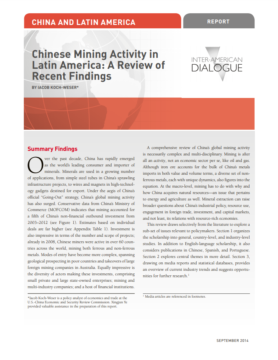The Politics Of Disaster Relief
After a 7.0 magnitude earthquake struck Haiti, the aftershock reached China in ways that few anticipated.The earthquake forced Chinese leaders to navigate the tricky politics of disaster relief.
Margaret Myers, director of the Inter-American Dialogue's Asia and Latin America Program, appeared on the American University Center for Latin American and Latino Studies China Messaging Podcast, speaking with Center Director Eric Hershberg about China's Digital Silk Road and related developments in Latin America and the Caribbean.
"The scope of the Digital Silk Road isn’t well defined—it’s open for interpretation. But in my view, it encompasses really all of the aspects of what China calls 'new infrastructure,' which is really essentially all innovation and tech-related industries. These new industries, which...have been promoted amid the pandemic, factor in China domestic growth and are being promoted overseas quite extensively, even right now when cross-border activity is more limited than what we’ve seen in the past. And here we’re talking about 5G, which receives a lot of attention, and telecoms in general, but also artificial intelligence applications, sales of Lenovo computers and Huawei handsets, or investments in ultra-high voltage transmission lines, smart grids, renewable energy, really all-encompassing."
"In terms of how it applies to Latin America and the Caribbean, what we are seeing there is just an absolute proliferation of activity in the delivery of all of these products. In part because Chinese companies are providing lower prices, in many cases, and because Latin American and Caribbean governments view digital connectivity and digital services as a critical means by which to eventually exit, ideally, this difficult economic period."
"We are also seeing a lot of activity in mining, which I’m sure we’ll talk about—lithium really factors prominently but also gold and other minerals with technological applications. And, in addition, I would say we are seeing wide-ranging Chinese actors. It’s not just the companies—the Huaweis and ZTEs, for example—but an extensive apparatus of government and quasi-governmental actors, university networks, overseas Chinese communities, sister cities and provinces networks, that are really promoting this activity. And they’re doing it not just at the national level, but at the state and provincial level and at the city level, which makes a lot of sense because smart cities and safe cities technologies are applied at the local level, so require local-level buy-in."
"Accompanying all of this is an effort to coordinate on tech-related policy—'policy coordination' is also a feature of the BRI. To consider, alongside LAC governments, who should govern the internet, and whether enhancing personal safety, through AI-enabled surveillance, for example, is worth sacrificing some civil liberties and freedoms."
"It also entails deal-making with companies—whether public or private—that have explicit ties and obligations to share their data with Beijing. We’ve seen this most extensively with Didi’s recent rein-in by the Chinese government. And whether this matters to the region or not is an important question. Data privacy sensitivities I think are less pronounced in Latin America and the Caribbean than in the United States, perhaps, but it will be critical for Latin American and Caribbean nations to review or upgrade their data privacy policies, or tech transfer requirements, or local content regulations to ensure that they derive sufficient benefit from the digital silk road, however we define it.
[...]
After a 7.0 magnitude earthquake struck Haiti, the aftershock reached China in ways that few anticipated.The earthquake forced Chinese leaders to navigate the tricky politics of disaster relief.
Despite reports in recent months that Mexican manufacturing is experiencing a resurgence, Mexico’s industrial sector faces tremendous challenges.
China has rapidly emerged as the world’s leading consumer and importer of minerals.

